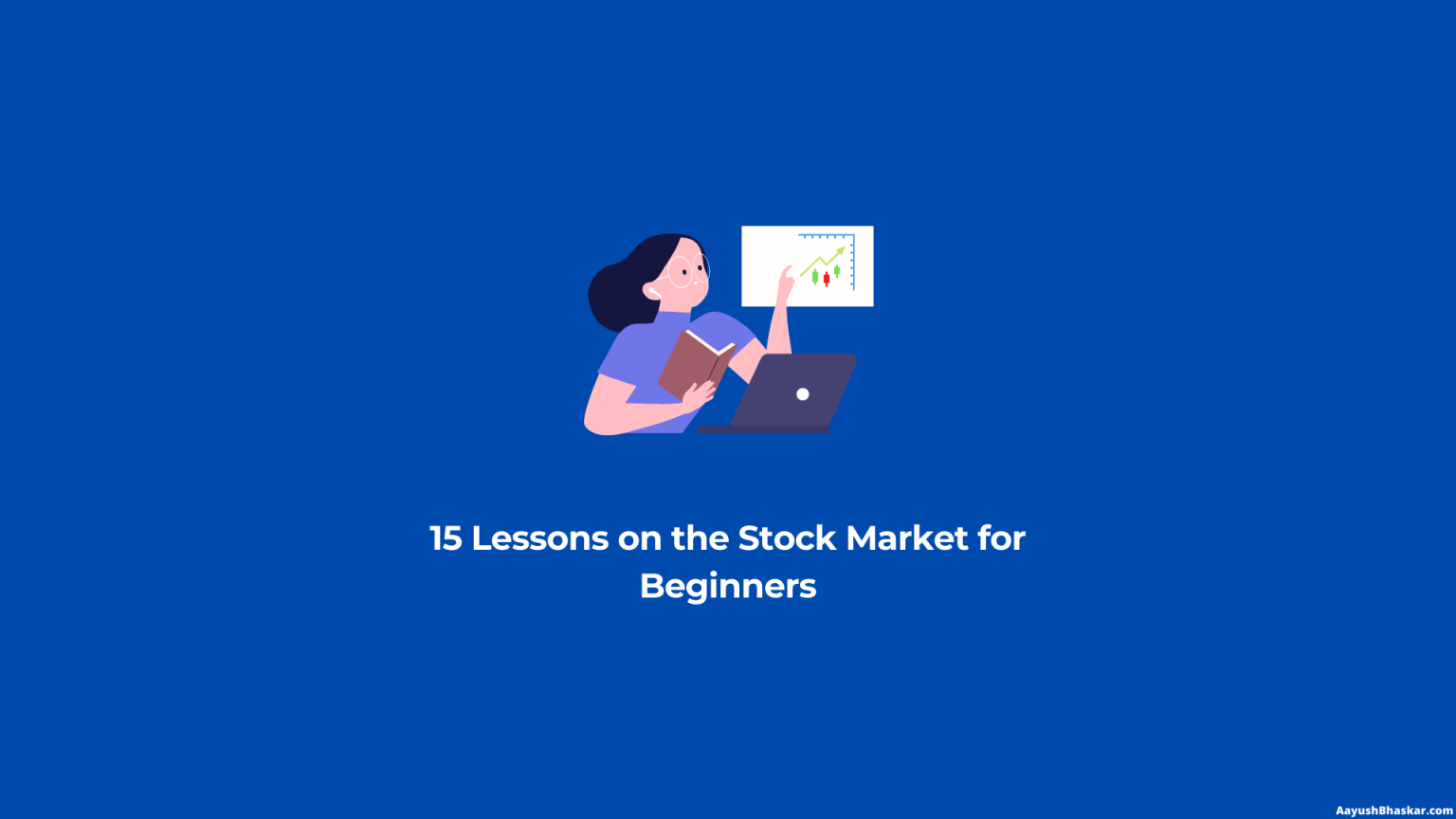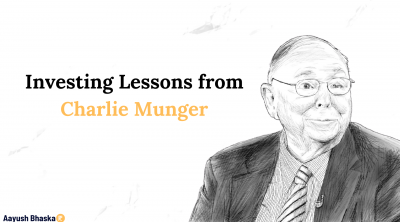The stock market is nothing short of a rollercoaster ride for a trader in all their three stages of trading: beginner trading, intermediate trading, and expert trading.
Nevertheless, starting to trade as a novice in the market is definitely the most challenging since you are not aware of how things work, what to do and how to even place an order.
This is where our article will help you as we will talk about some of the important lessons you need to know as a beginner investor or trader in the stock market.
Always have a trading plan
Entering the stock market without a trading plan is like hopping onto a taxi without a destination in mind – things are bound to go haywire.
Always make sure that you devise a trading plan that includes your trading goals, risk appetite, trading strategies, and long-term objective of being a part of the stock market.
Stick to the trading plan throughout our stock market journey to witness successful results.
Portfolio Diversification
If you are just starting to trade or invest in the stock market, the chances are that you are only looking at a stock or two.
Well, we agree with that. Starting small is an intelligent thing to do. However, facts state that the more diversified your portfolio is, the greater is the probability of success.
Choose between a few large-cap, mid-cap and small-cap companies that satisfy both your risk and reward needs.
The large-cap stocks will help you stay secured with small returns, the mid-cap stocks will help you have a moderate level of both risk and reward, whereas the small-cap stocks may be risky but offer tremendous returns.
- Large-cap companies are the ones that have a market capitalization exceeding $10 billion, like Reliance Industries, TCS, Infosys, and more.
- Mid-cap companies are the ones that have a market capitalization between $2 billion-$10 billion, like Gillette India, Zee Entertainment, Mahindra Lifespaces, and more.
- Small-cap companies are the ones that have a market capitalization below $2 billion, like Sobha Ltd., Bajaj Consumer Care, Heidelberg Cement, and more.

Buy low and sell high
This is one mantra every stock market trader/investor should abide by.
Buying stocks at dipping prices and selling them as the market booms enable traders to lock in maximum profits. However, it is not as simple as it sounds.
At times, when you buy stocks in a falling market, the prices tend to fall even further, which could instill fear in the trader and lead them to exit the market at a lower price, bearing losses.
Instead, wait for the market to rise back up and only sell when you are either at the break-even point or above because every falling market is followed by a rising one, and history is a witness.
Avoid the short term, think long term
If you are entering the stock market with a perspective to earn some extra income and invest in stocks as an asset, you need to stop thinking from a trader’s POV and enter an investor’s POV.
Not only does long-term investing help you save on taxes, but it also helps you create wealth that actually feels like ‘wealth.’
Sure, you can trade in the short term as well, like a day trader, and enjoy small profits.
But, to get a hold onto better opportunities and wait for financial reports of the companies to see the profit potential is how you can make six digits or above in the market.
Of course, subject to a lot of other factors like economic condition, portfolio enhancement, and strategic application.

Learn trading strategies and charts that support them
Several strategies like the swing trading strategy, gap trading strategy, range, reversal trading strategy, and a lot more are essential in the stock market to time the trades.
Along with that, one must know how to read charts like candlestick charts, Bollinger bands, Renko charts, and more that provide traders with the ideal entry and exit prices.

Capture trends before it’s too late
Analyzing the market through market sentiment and charts helps you capture market trends before they end.
These market trends, in turn, help you to make the right trading decisions. For example, if you realize an uptrend in the market, you can enter the trade to profit from the increasing prices.
On the other hand, if you realize a downtrend in the market, you can short the position to benefit from the price difference later.
The price of the stock does not make it cheap or expensive
Evaluating if a stock is worth it is not directly proportional to its price.
An Rs. 10,000 stock is not expensive, and a Rs. 500 stock is not cheap – you need to invest in stocks that align with your trading goals and objectives.
If you want to invest in stable companies that provide stable returns, it is better to buy 50 stocks worth Rs. 500,000 instead of buying 1000 stocks of Rs. 500 each to just stock up on quantity.

Keep emotions aside
Trading in the stock market should be purely technical and not emotional at all.
Just because you have some sentiments attached to a company (maybe because you have worked there before or they gave you your favorite pair of jeans) does not mean that that particular company is the best pick for you.
Analyze the historical price movements of the stock, the future price predictions, and its performance in the market to place orders mindfully.
Expect the unexpected
Nothing in the stock market comes with a guarantee, and surety is not a word to be associated with it.
The markets can change at any time, any moment of the day, unexpectedly, by falling drastically one second to shooting back up in no time.
Hence, always be prepared for the unexpected when trading in the stock market and react to the market accordingly.
Be prepared to lose
No matter how profitable the stock market looks, every situation has two faces, and so does this. If you can make millions in the market, you can also lose millions.
However, losing in the stock market is also an experience that traders must understand.
There will always be trades that make you win big and, at times, lose big too. The only sane thing to do in this situation is to learn from your mistakes and not repeat them in the future.
Follow the market news, but don’t always buy it
Financial news does provide insight into the financial markets, but it should not be the sole reason behind changing your entire trading strategy.
Follow the news regularly but make decisions as per your analysis and understanding of the market you can also consult your broker if you are not confident enough with your decision and take the next step accordingly.
At times, news events can manipulate you into making decisions that you otherwise would not want to.

Do not fall into the trap of penny stocks
Stocks that are really cheap can be exciting because they provide you with larger quantities in less amount.
However, it is always advised to stay as away as you can from penny stocks since most of these stocks are illiquid and highly risky.
Unless and until there is actually a real opportunity and chance of growth, do not invest in them.

Utilize stop and limit orders
Most traders do not understand how important it is to utilize stop and limit orders to minimize trading risk.
A stop-loss order can be set at the price point, which is your maximum loss-taking capacity, beyond which if the trade falls, your trade will be closed automatically.
Similarly, limit orders also help you place a particular price to buy or sell trades. If the trade reaches this price, your order is executed automatically, saving you big possible losses later.
Expect realistic profits only
The stock market can be extremely enticing when you first enter it.
Hearing about people making 6 and even 7 digits in a single month can raise your expectations more than ever.
However, you must understand that the stock market provides you with only realistic profits most of the time, which is equal to around 60% of the trade value.
Beyond this is a once in a blue moon deal!
Try demo trading before investing real money
You can still experience stock market trading without taking the actual risk associated with it. Use an online demo trading account which most brokers offer to buy and sell real stocks without investing real money.
This will provide you with an insight into the functioning of the stock market and help you get comfortable with the tools and buttons on the application.
Once you are sure that you have gotten the hang of it, shift to a real account and start trading with real money to gain real profits!
Wrapping Up
Entering the stock market is a wise decision as it provides you with an asset opening opportunity, great profits, and a medium to channel your hard-earned money to make wealth from wealth!
These 15 lessons shared above will help you make the right trades in the market and better investment decisions for the long term.








The Indian Stock Market is a great place to start investing your money, especially for beginners.
Thank you for sharing this blog with us, your blog is fascinating, and I am grateful you shared it with us. it provides valuable information for both website users and traders.